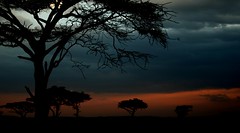Mystical comfort from Richard Dawkins
Permalinks to this entry: individual page or in monthly context. For more material from my journal, visit my home page or the archive.
 If you know of Richard Dawkins even a little bit, my post title here seems impossible. Aside from being a brilliant and groundbreaking biologist, he is also the world's most famous atheist, and quite militant about it, rejecting any form of "magical thinking" or supernaturality whatsoever. (His latest book is the subtly-titled The God Delusion
If you know of Richard Dawkins even a little bit, my post title here seems impossible. Aside from being a brilliant and groundbreaking biologist, he is also the world's most famous atheist, and quite militant about it, rejecting any form of "magical thinking" or supernaturality whatsoever. (His latest book is the subtly-titled The God Delusion.)
Yet this week, as I inevitably consider my own mortality after being diagnosed with an early stage, very treatable, but still cancerous form of cancer, he has inspired me, and brought me some comfort and mystical joy. And I don't think he would mind at all.
The source is the mind-bending CBC podcast of his recent Beatty Memorial Lecture at McGill University, titled "The Strangeness of Science" (MP3 file, about 52 minutes), originally broadcast on "Ideas" in November 2006. It is not a religious (or anti-religious) talk—he avoids any discussion of the topic until the Q&A at the end, when it of course comes up. Instead, it is a discussion of how we perceive our universe, and how what we understand about it arises from how we evolved into it, and, more critically, simply what size we are.
Only in the "middle world" we inhabit, where things exist in sizes of centimetres or metres or kilometres and seconds or minutes or hours or days or years, does our model of the universe around us make sense. For a microbe, gravity is largely irrelevant, for example, while surface tension and Brownian motion are the rules of the world. For a neutrino, there is no concept of "solid," and indeed our concept of "solid" is merely a useful construct because the forces between atoms in our bodies and other objects prevent them from passing through each other—even though their atoms consist almost entirely of empty space.
Over geological time scales, impossible things—or really, things that are only stupendously improbable—do happen. But we've evolved in the middle world of time and space, where highly improbable and impossible are, effectively, the same. So we treat them that way, even though they are not. Traveling faster than light really is, as far as we can tell, impossible. But a chemical soup turning into DNA, and then life? Simply very, very improbable on our timescale. Over billions of years of contingent selection, that DNA creating a brain that can wonder if that's impossible? Just improbable, or inevitable? That we don't know.
Even within our middle world, who we are defines what the world seems to us. About 28 minutes in, Dawkins says:
What we see of the real world is [...] a model of the real world [...] constructed so it's useful for dealing with the real world. The nature of the model in our head depends on the kind of animal we are. A flying animal is going to need a different kind of world model in its brain from a walking, a climbing, or a swimming animal.
So, despite their distant evolutionary relationship, a monkey, a squirrel, and a tree lizard probably model the world in much the same way. Switching minds, they would probably feel largely familiar and in place. So too would barn swallows and bats, even though one sees with light, and the other with ultrasound. Both need to navigate in the air, in three dimensions, at high speed, and to catch insects to eat.
Thus, we humans model things to match our relationship to our ancestral African savannah, and to each other, because we are social creatures. We make maps that emphasize two dimensions, over which we can walk or ride or drive. We relate to non-human things the way we relate to other people. We berate our computers and cars when they misbehave. We say that weather is "wrathful" or "friendly" when it is no such thing. We see intent in the motions of the stars and planets. We love our pet snails, or pet rocks, or stuffed animals, when they cannot love us back—even when we know that.
How is that comforting? Because the very nearly impossible, evolved, middle world, human-focused, solid-believing, bipedal great ape brain model of the world that I have in my head is my kind of miracle. Not one that anyone made, as far as I'm concerned, but one that simply is. None of the atoms that make me up today were part of me when I developed my earliest memories—of the treads on icefield snow coaches, and a giant steam locomotive, both near Jasper, Alberta—on a trip with my parents when I was two years old. And yet I still remember going there. That is amazing.
I am tremendously fortunate to be a living, world-modeling thing, able to have those memories, to experience the love of my wife and children and family, to write words and to make music, to learn, to have had 37 years of it so far—and, I expect and plan, somewhat more than that many years still to come. Understanding that brings me joy, though I am not a philosopher, and can't quite say why.
This life, however long it is, is my only chance to be part of the universe. And I will take it.







